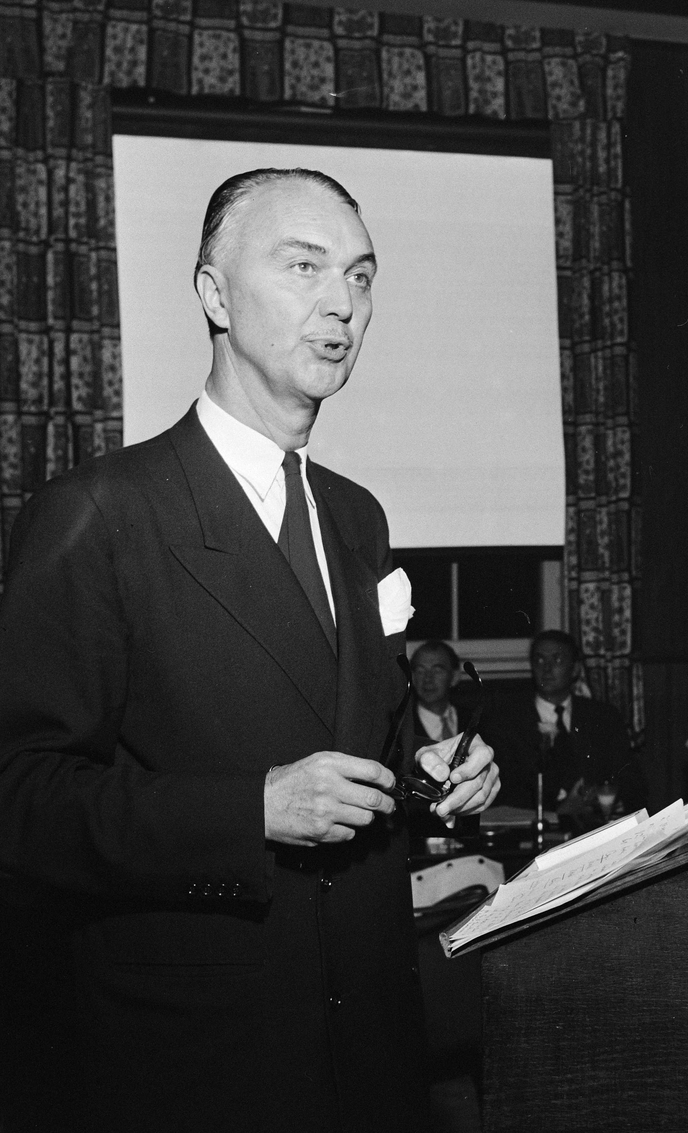|
Johan Vogt
Johan Herman Vogt (23 September 1900 – 17 July 1991) was a Norwegian social economist, author and journal editor. Biography Vogt was born in Kristiania (now Oslo), Norway. He was a son of Johan Herman Lie Vogt (1858–1932) and Martha Johanne Abigael Kinck (1861–1908). His father was a professor in geology at Norwegian Institute of Technology in Trondheim. His twin brother Jørgen Herman Vogt (1900–1972) was a newspaper editor and member of the Norwegian Parliament. His brother Fredrik Vogt (1892–1970) was an engineer and rector at the Norwegian Institute of Technology. His brother Thorolf Vogt (1888–1958) was a geologist and Arctic explorer. He earned his Cand.oecon. from the University of Oslo in 1923. He was a member of Mot Dag from 1921, and chaired the Norwegian section of Clarté from 1927. During the Occupation of Norway by Nazi Germany, Vogt was arrested in 1941. He was sent to the Grini concentration camp from February 1945 until the liberation ... [...More Info...] [...Related Items...] OR: [Wikipedia] [Google] [Baidu] |
Johan Herman Lie Vogt
Johan Herman Lie Vogt (14 October 18583 January 1932) was a Norwegian geologist and petrologist. Vogt was a professor at the University of Oslo and at the Norwegian Institute of Technology. Biography Vogt was born in Tvedestrand, Norway. He was a son of physician Olaus Fredrik Sand Vogt and Mathilde Eliza Lie. He was the nephew of mathematician Sophus Lie (1842–1899). Psychiatrist Ragnar Vogt (1870-1943) was a younger brother. Vogt studied at the Technical Institute in Dresden and in 1880 graduated from the University of Christiania (now University of Oslo). Vogt was cand.min. from 1880. Career Vogt was appointed professor in metallurgy at the University of Christiania from 1886 to 1912. When the Norwegian Institute of Technology in Trondheim was established. Vogt became the college's first professor of geology and held the position 1912-28. Vogt was responsible for developing the institute's department of geology. He was succeeded by his son Thorolf Vogt. Johan Vogt was ... [...More Info...] [...Related Items...] OR: [Wikipedia] [Google] [Baidu] |
Thorolf Vogt
Thorolf Vogt. Thorolf Vogt (7 June 1888 8 December 1958) was a Norwegian geologist, professor and Arctic explorer. Biography He was born in Vang, Hedmark, Norway. He was the son of Johan Herman Lie Vogt (1858–1932) and Martha Johanne Abigael Kinck. His elder brother Fredrik Vogt (1892–1970) was director general of the Norwegian Water Resources and Energy Agency, His younger twin brothers were Johan Vogt (1900–91), a social economist and professor at the University of Oslo and Jørgen Vogt (1900–72) newspaper editor and member of the Norwegian Parliament. He studied at the Royal Frederik University (now University of Oslo) and completed his examen artium in 1906. He subsequently went on trips to universities in both Vienna and Göttingen. In 1909 he got a job as an assistant at the Norwegian Geological Survey where from 1914 to 1929 he held the position of state geologist. From 1915 to 1923 he was research associate at the University of Oslo. In 1928, he defende ... [...More Info...] [...Related Items...] OR: [Wikipedia] [Google] [Baidu] |
Oslo
Oslo ( or ; ) is the capital and most populous city of Norway. It constitutes both a county and a municipality. The municipality of Oslo had a population of in 2022, while the city's greater urban area had a population of 1,064,235 in 2022, and the metropolitan area had an estimated population of in 2021. During the Viking Age, the area was part of Viken. Oslo was founded as a city at the end of the Viking Age in 1040 under the name Ánslo, and established as a ''kaupstad'' or trading place in 1048 by Harald Hardrada. The city was elevated to a bishopric in 1070 and a capital under Haakon V of Norway around the year 1300. Personal unions with Denmark from 1397 to 1523 and again from 1536 to 1814 reduced its influence. After being destroyed by a fire in 1624, during the reign of King Christian IV, a new city was built closer to Akershus Fortress and named Christiania in honour of the king. It became a municipality ('' formannskapsdistrikt'') on 1 January 1838. ... [...More Info...] [...Related Items...] OR: [Wikipedia] [Google] [Baidu] |
World War II
World War II or the Second World War (1 September 1939 – 2 September 1945) was a World war, global conflict between two coalitions: the Allies of World War II, Allies and the Axis powers. World War II by country, Nearly all of the world's countries participated, with many nations mobilising all resources in pursuit of total war. Tanks in World War II, Tanks and Air warfare of World War II, aircraft played major roles, enabling the strategic bombing of cities and delivery of the Atomic bombings of Hiroshima and Nagasaki, first and only nuclear weapons ever used in war. World War II is the List of wars by death toll, deadliest conflict in history, causing World War II casualties, the death of 70 to 85 million people, more than half of whom were civilians. Millions died in genocides, including the Holocaust, and by massacres, starvation, and disease. After the Allied victory, Allied-occupied Germany, Germany, Allied-occupied Austria, Austria, Occupation of Japan, Japan, a ... [...More Info...] [...Related Items...] OR: [Wikipedia] [Google] [Baidu] |
Academic Staff Of The University Of Oslo
An academy (Attic Greek: Ἀκαδήμεια; Koine Greek Ἀκαδημία) is an institution of tertiary education. The name traces back to Plato's school of philosophy, founded approximately 386 BC at Akademia, a sanctuary of Athena, the goddess of wisdom and Skills, skill, north of Ancient Athens, Athens, Greece. The Royal Spanish Academy defines academy as scientific, literary or artistic society established with public authority and as a teaching establishment, public or private, of a professional, artistic, technical or simply practical nature. Etymology The word comes from the ''Academy'' in ancient Greece, which derives from the Athenian hero, ''Akademos''. Outside the city walls of Athens, the Gymnasium (ancient Greece), gymnasium was made famous by Plato as a center of learning. The sacred space, dedicated to the goddess of wisdom, Athena, had formerly been an olive Grove (nature), grove, hence the expression "the groves of Academe". In these gardens, the philos ... [...More Info...] [...Related Items...] OR: [Wikipedia] [Google] [Baidu] |
University Of Oslo Alumni
A university () is an institution of tertiary education and research which awards academic degrees in several academic disciplines. ''University'' is derived from the Latin phrase , which roughly means "community of teachers and scholars". Universities typically offer both undergraduate and postgraduate programs. The first universities in Europe were established by Catholic monks. The University of Bologna (), Italy, which was founded in 1088, is the first university in the sense of: *being a high degree-awarding institute. *using the word (which was coined at its foundation). *having independence from the ecclesiastic schools and issuing secular as well as non-secular degrees (with teaching conducted by both clergy and non-clergy): grammar, rhetoric, logic, theology, canon law and notarial law.Hunt Janin: "The university in medieval life, 1179–1499", McFarland, 2008, , p. 55f.de Ridder-Symoens, Hilde''A History of the University in Europe: Volume 1, Universities in the Mi ... [...More Info...] [...Related Items...] OR: [Wikipedia] [Google] [Baidu] |
1991 Deaths
This is a list of lists of deaths of notable people, organized by year. New deaths articles are added to their respective month (e.g., Deaths in ) and then linked below. 2025 2024 2023 2022 2021 2020 2019 2018 2017 2016 2015 2014 2013 2012 2011 2010 2009 2008 2007 2006 2005 2004 2003 2002 2001 2000 1999 1998 1997 1996 1995 1994 1993 1992 1991 1990 1989 1988 1987 1986 Earlier years ''Deaths in years earlier than this can usually be found in the main articles of the years.'' See also * Lists of deaths by day * Deaths by year (category) {{DEFAULTSORT:deaths by year ... [...More Info...] [...Related Items...] OR: [Wikipedia] [Google] [Baidu] |
1900 Births
As of March 1 ( O.S. February 17), when the Julian calendar acknowledged a leap day and the Gregorian calendar did not, the Julian calendar fell one day further behind, bringing the difference to 13 days until February 28 ( O.S. February 15), 2100. Summary Political and military The year 1900 was the end of the 19th century and the beginning of the 20th century. Two days into the new year, the U.S. Secretary of State John Hay announced the Open Door Policy regarding China, advocating for equal access for all nations to the Chinese market. The Galveston hurricane would become the deadliest natural disaster in United States history, killing between 6,000 and 12,000 people, mostly in and near Galveston, Texas, as well as leaving 10,000 people homeless, destroying 7,000 buildings of all kinds in Galveston. As of 2025, it remains the fourth deadliest Atlantic hurricane on record. An ongoing Boxer Rebellion in China escalates with multiple attacks by the Boxers on Chines ... [...More Info...] [...Related Items...] OR: [Wikipedia] [Google] [Baidu] |
Henrik Groth
Henrik Johan Florentz Groth (11 October 1903 – 10 August 1983) was a Norwegian publisher and essayist, who was managing director A chief executive officer (CEO), also known as a chief executive or managing director, is the top-ranking corporate officer charged with the management of an organization, usually a company or a nonprofit organization. CEOs find roles in variou ... of the Cappelen publishing company from 1947 to 1973. Biography Groth was born and grew up in Kristiania (now Oslo), Norway. He was the son of Halfdan Emil Groth (1874–1929) and Valborg Haagaas (1879–1960). His father held senior positions in the Den Norske Creditbank and was later managing director of Skogeierbanken A/S. His first cousins included Henriette Bie Lorentzen, co-founder of Nansen Academy. He first became editor in the publication ''Vor verden'' which Ronald Fangen edited and ''Rivertons magasin'' edited by Sven Elvestad. He was hired in the publishing house J.W. Cappelens Fo ... [...More Info...] [...Related Items...] OR: [Wikipedia] [Google] [Baidu] |
Store Norske Leksikon
The ''Great Norwegian Encyclopedia'' (, abbreviated ''SNL'') is a Norwegian-language online encyclopedia. It has several subdivisions, including the Norsk biografisk leksikon. The online encyclopedia is among the most-read Norwegian published sites, with up to 3.5 million unique visitors per month. Paper editions (1978–2007) The ''SNL'' was created in 1978, when the two publishing houses Aschehoug and Gyldendal merged their encyclopedias and created the company Kunnskapsforlaget. Up until 1978 the two publishing houses of Aschehoug and Gyldendal, Norway's two largest, had published ' and ', respectively. The respective first editions were published in 1906–1913 (Aschehoug) and 1933–1934 (Gyldendal). The slump in sales of paper-based encyclopedias around the turn of the 21st century hit Kunnskapsforlaget hard, but a fourth edition of the paper encyclopedia was secured by a grant of ten million Norwegian kroner from the foundation Fritt Ord in 2003. The f ... [...More Info...] [...Related Items...] OR: [Wikipedia] [Google] [Baidu] |
Norwegian Academy Of Sciences
The Norwegian Academy of Science and Letters (, DNVA) is a learned society based in Oslo, Norway. Its purpose is to support the advancement of science and scholarship in Norway. History The Royal Frederick University in Christiania was established in 1811. The idea of a learned society in Christiania surfaced for the first time in 1841. The city of Trondhjem had no university, but had a learned society, the Royal Norwegian Society of Sciences and Letters, established in 1760. The purpose of a learned society in Christiania was to support scientific studies and aid publication of academic papers. The idea of the Humboldt-inspired university, where independent research stood strong, had overtaken the instrumental view of a university as primarily a means to produce civil servants. The city already had societies for specific professions, for instance the Norwegian Medical Society, which was founded in 1833. However, these societies were open to both academics within medicine as w ... [...More Info...] [...Related Items...] OR: [Wikipedia] [Google] [Baidu] |






